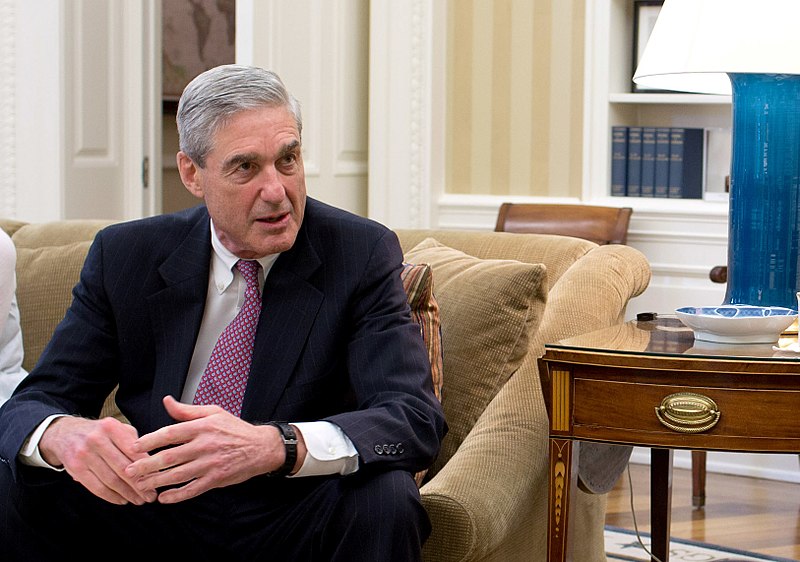The high schooler’s guide to the Mueller Report
A crash course in the basics of the Mueller Report.
(Photo cred – White House)
The Mueller report is quickly becoming a household topic, but let’s be real – it’s 448 pages long, and you’ve got things to do. That’s why we’ve assembled a crash course on the basics of the Mueller report and what it means.
What is the Mueller report?
In short, it’s the culmination of nearly two years of investigation by special counsel Robert Mueller and his team. According to Vox, Mueller’s role as a special counsel is to work as a prosecutor separated from the Department of Justice, and because of this, he can operate with some independence.
The report itself is divided into two volumes- collusion and obstruction. The “collusion” volume refers to the question of if Trump associates had any part in Russian interference in the 2016 presidential election. The “obstruction” volume refers more to if President Trump has been covering for his associates and purposely impeding the investigation.
What does the report actually say?
President Trump has made his stance on the outcome of the report clear with several claims of “No Collusion, No Obstruction” on Twitter, but that isn’t necessarily true. According to the Electoral Vote, the report did technically clear President Trump of any collusion.
The most important thing to know here is that, according to Vox, Mueller never actually expressly answered the question of conclusion. He considered it much too generalized, and said in the report that “[c]ollusion is not a specific offense or theory of liability found in the United States Code, nor is it a term of art in federal criminal law.”
However, the fact President Trump is out of the woods doesn’t mean his staff is in the clear.
According to Vox, one of President Trump’s foreign policy advisors, George Papadopoulos, attempted to arrange meetings between Trump and Putin. Another important thing to note here is that Trump personally approved Papadopoulos’ work on this front, removing any possibility of the President having plausible deniability.
This, combined with matters like how Donald Trump Jr. arranged a meeting with Russian officials with the direct intent of obtaining “dirt” on Hillary Clinton, paints an unflattering picture of Trump’s associates.
Okay, now what’s the deal with obstruction?
Very notably, the report stated “…if we had confidence after a thorough investigation of the facts that the President clearly did not commit obstruction of justice, we would so state. Based on the facts and applicable legal standards, we are unable to reach that judgment.” This makes it clear that while Trump isn’t charged with obstruction of justice, he distinctly isn’t called innocent, either.
It’s no secret that the Trump administration has had many important figures resign, and the Mueller report sheds light on some of the circumstances around the resignations. Multiple times, President Trump asked members of his staff to get rid of Mueller, and they repeatedly defied him, with figures such as White House Counsel Don McGahn even going so far as to resign instead of continuing to obey President Trump.
The report outlines how staff members of the Trump administration have a history of ignoring orders, some even from the Oval Office, and considerable conflict among staffers. While this isn’t something new, it’s highlighted in the report.
Another theme to come out of the Mueller report is changed stories. According to the report, members of the Trump administration lied and issued misleading statements both to the public and the investigation team, casting doubt on the reliability of the administration as a whole.
Notably, White House Press Secretary Sarah Huckabee Sanders admitted to lying in the report. “Sanders told this Office that her reference to hearing from ‘countless members of the FBI’ was a ‘slip of the tongue.’ She also recalled that her statement in a separate press interview that rank-and-file FBI agents had lost confidence in Comey was a comment she made ‘in the heat of the moment’ that was not founded on anything,” the report reads.
However, the report isn’t all bad for the Trump administration.
All Americans have a big relief- the president has been exonerated of a conspiracy with Russia. Even including the pretty heavy obstacles that the obstruction investigation brought up, the report is, in the words of the Sydney Morning Herald, “toxic but not fatal to Trump presidency.”
The takeaway from The Hill was that the report will cause some significant challenges for Democrats and specifically House Speaker Nancy Pelosi (D-CA). Democrats, already divided on where to take policy, will face obstacles in the future, especially if they want to pursue further investigation into obstruction, and after that, impeachment.
Is President Trump going to be impeached?
Most analysts are coming to one conclusion: no.
President Trump wasn’t charged on either count of collusion or obstruction, which is a pretty big roadblock if Congressional Democrats wanted to impeach him. According to The Washington Post, Nancy Pelosi, House Speaker and leader of the Democratic party, told lawmakers she and other House Democratic leaders they have “no immediate plans to open impeachment proceedings.”
In addition, any impeachment would have to be a bipartisan effort, and while there are vehement Trump critics such as Mitt Romney (R-UT) among Republicans, most of the party would be reluctant to risk infighting like that.
Most politicians, for varied reasons, are of the opinion that impeachment isn’t the road to take. However, the Mueller report will undoubtedly be of massive importance in 2020, and it’s then that Americans will be casting their vote of guilty or not guilty.































